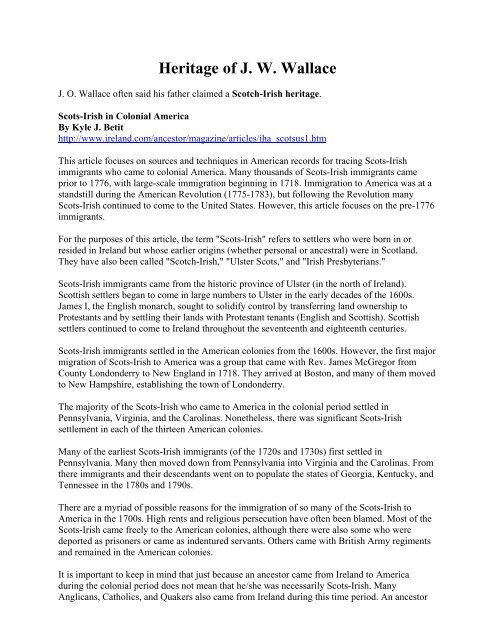Memories of Wallace Heritage - Official website of Rev. JO Wallace
Memories of Wallace Heritage - Official website of Rev. JO Wallace
Memories of Wallace Heritage - Official website of Rev. JO Wallace
You also want an ePaper? Increase the reach of your titles
YUMPU automatically turns print PDFs into web optimized ePapers that Google loves.
<strong>Heritage</strong> <strong>of</strong> J. W. <strong>Wallace</strong><br />
J. O. <strong>Wallace</strong> <strong>of</strong>ten said his father claimed a Scotch-Irish heritage.<br />
Scots-Irish in Colonial America<br />
By Kyle J. Betit<br />
http://www.ireland.com/ancestor/magazine/articles/iha_scotsus1.htm<br />
This article focuses on sources and techniques in American records for tracing Scots-Irish<br />
immigrants who came to colonial America. Many thousands <strong>of</strong> Scots-Irish immigrants came<br />
prior to 1776, with large-scale immigration beginning in 1718. Immigration to America was at a<br />
standstill during the American <strong>Rev</strong>olution (1775-1783), but following the <strong>Rev</strong>olution many<br />
Scots-Irish continued to come to the United States. However, this article focuses on the pre-1776<br />
immigrants.<br />
For the purposes <strong>of</strong> this article, the term "Scots-Irish" refers to settlers who were born in or<br />
resided in Ireland but whose earlier origins (whether personal or ancestral) were in Scotland.<br />
They have also been called "Scotch-Irish," "Ulster Scots," and "Irish Presbyterians."<br />
Scots-Irish immigrants came from the historic province <strong>of</strong> Ulster (in the north <strong>of</strong> Ireland).<br />
Scottish settlers began to come in large numbers to Ulster in the early decades <strong>of</strong> the 1600s.<br />
James I, the English monarch, sought to solidify control by transferring land ownership to<br />
Protestants and by settling their lands with Protestant tenants (English and Scottish). Scottish<br />
settlers continued to come to Ireland throughout the seventeenth and eighteenth centuries.<br />
Scots-Irish immigrants settled in the American colonies from the 1600s. However, the first major<br />
migration <strong>of</strong> Scots-Irish to America was a group that came with <strong>Rev</strong>. James McGregor from<br />
County Londonderry to New England in 1718. They arrived at Boston, and many <strong>of</strong> them moved<br />
to New Hampshire, establishing the town <strong>of</strong> Londonderry.<br />
The majority <strong>of</strong> the Scots-Irish who came to America in the colonial period settled in<br />
Pennsylvania, Virginia, and the Carolinas. Nonetheless, there was significant Scots-Irish<br />
settlement in each <strong>of</strong> the thirteen American colonies.<br />
Many <strong>of</strong> the earliest Scots-Irish immigrants (<strong>of</strong> the 1720s and 1730s) first settled in<br />
Pennsylvania. Many then moved down from Pennsylvania into Virginia and the Carolinas. From<br />
there immigrants and their descendants went on to populate the states <strong>of</strong> Georgia, Kentucky, and<br />
Tennessee in the 1780s and 1790s.<br />
There are a myriad <strong>of</strong> possible reasons for the immigration <strong>of</strong> so many <strong>of</strong> the Scots-Irish to<br />
America in the 1700s. High rents and religious persecution have <strong>of</strong>ten been blamed. Most <strong>of</strong> the<br />
Scots-Irish came freely to the American colonies, although there were also some who were<br />
deported as prisoners or came as indentured servants. Others came with British Army regiments<br />
and remained in the American colonies.<br />
It is important to keep in mind that just because an ancestor came from Ireland to America<br />
during the colonial period does not mean that he/she was necessarily Scots-Irish. Many<br />
Anglicans, Catholics, and Quakers also came from Ireland during this time period. An ancestor


